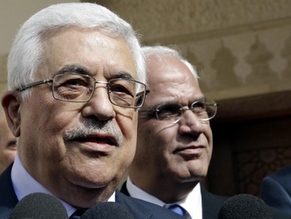|
World Jewish News

Palestinian leader Mahmud Abbas speaks to reporters in front of Palestinian chief negotiator Saeb Erekat (R), after his talks with King Abdullah II of Jordan in Amman on Wednesday. Photo by: AFP
|
Palestinians: Peace negotiations with Israel have ended
26.01.2012, Israel The time frame that the Palestinians have allowed for talks with Israel in Amman under Jordanian auspices expires on Thursday. According to diplomatic sources associated with the Middle East Quartet - the United States, United Nations, European Union and Russia - last-minute efforts are underway to head off the talks' collapse, but the prospects seem slim.
Prime Minister Benjamin Netanyahu's representative to the Amman talks, Isaac Molho, met on Wednesday in the Jordanian capital for a fifth time with the head of the Palestinian negotiating team Saeb Erekat - but at this point no formula has been reached that would enable the talks to continue. Erekat made it clear that because Israel has not presented its position on the issue of borders with a Palestinian state, from the Palestinians' standpoint, the talks have ended.
After Wednesday's meeting, Jordanian Foreign Minister Nasser Judeh, under whose auspices the five rounds of discussions have taken place, issued a statement in which he did his best to avoid proclaiming the talks a failure. He said the results of the discussions are being evaluated and that consultations would be undertaken with Israel, the Palestinians and members of the Quartet over a future course.
Before the latest Molho-Erekat meeting, Palestinian Authority President Mahmoud Abbas met in Amman with Jordanian King Abdullah and told the monarch from his standpoint talks with Israel had run their course without results. Abbas said that Israel had refused to recognize the borders of a Palestinian state, but if there was a change there was nothing preventing a return to the negotiating table.
Abbas said he would consult with Arab allies next week to figure out how to proceed. He is under pressure to extend the Jordanian-mediated exploratory talks, which the international community hopes will lead to a resumption of long-stalled formal negotiations on establishing a Palestinian state.
Israel said on Wednesday that it is willing to continue the dialogue. Abbas did not close the door to continued meetings, saying he will decide after consultations with the Arab League on February 4. A Palestinian walkout could cost Abbas international sympathy at a time when he seeks global recognition of a Palestinian state in the West Bank, Gaza and East Jerusalem.
The gaps between the leaders are vast, and Abbas apparently believes there is no point in returning to formal negotiations without assurances, such as marking the pre-1967 war lines as a basis for border talks and halting Israeli settlement construction. Netanyahu says everything should be discussed in negotiations and insists he is serious about reaching a deal by year's end.
Though there have been talks off and on, the last substantive round was in late 2008, when Israel informally proposed a deal and the Palestinians did not respond. When Netanyahu took office the next year, he took the proposal, including a state in most of the territories the Palestinians claim, off the table. A round of talks started in late 2010 by President Barack Obama quickly sputtered over the settlement issue.
Visiting European Union foreign policy chief Catherine Ashton has also scheduled two separate meetings with Abbas and Netanyahu to try to salvage the exploratory talks. Two officials involved in the contacts said she is trying to put together a package of Israeli incentives that would keep the Palestinians from walking away.
"We need to keep talks going and increase the potential of these talks to become genuine negotiations," Ashton said.
Before his meeting with Ashton, Netanyahu said, "We've been trying to make sure that the talks between us and the Palestinians will continue. That is our desire."
By Barak Ravid
Haaretz.com
|
|
